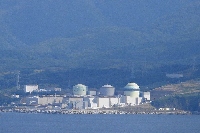Last Japanese reactor in outage
04 May 2012
Japan will find itself without nuclear power for the first time since 1970 as the last of its currently operating nuclear reactors prepares to go offline.
 |
| Hokkaido Electric’s Tomari plant (Image: Mugu-shisai) |
Hokkaido Electric’s Tomari 3 will shut down for a scheduled periodic inspection outage on 5 May. The inspection itself will take about 71 days, but when the 912 MWe pressurized water reactor can expect to return to operation remains unknown. Following the Fukushima Daiichi nuclear accident of 2011, the Japanese government required all of its nuclear plants to undergo two-phase ‘stress tests’ to verify their ability to withstand extreme events. The first phase of test must be carried out while the reactor is offline during its first regularly scheduled outage.
In normal operations, Japan’s nuclear power plants are taken offline for safety inspections every 13-18 months, so nearly 14 months on from the Fukushima Daiichi accident, all of Japan’s reactors have now reached their prescheduled maintenance outages. Although the tests have been completed at some of them, no reactor has yet been given the final go-ahead to restart. The end result is a nuclear power hiatus for a country that normally relies on its reactors to supply around 30% of its energy.
The findings of the stress tests results for two of Kansai’s reactors, Ohi 3 and 4, have already met with approval from Japanese nuclear regulators and the government has voiced its approval for the units to restart. However, approval for restarts at the local level has not yet been secured.
Without its nuclear plants, Japan is having to turn to other sources of power. According to figures from the Japanese Atomic Industry Forum, the country faces a 12% shortage of electricity in summer 2012. Meanwhile additional fossil fuel imports are costing it about $40 billion, or $333 per person, per year while its carbon emissions have risen some 14% above 1990 levels.
Researched and written
by World Nuclear News
